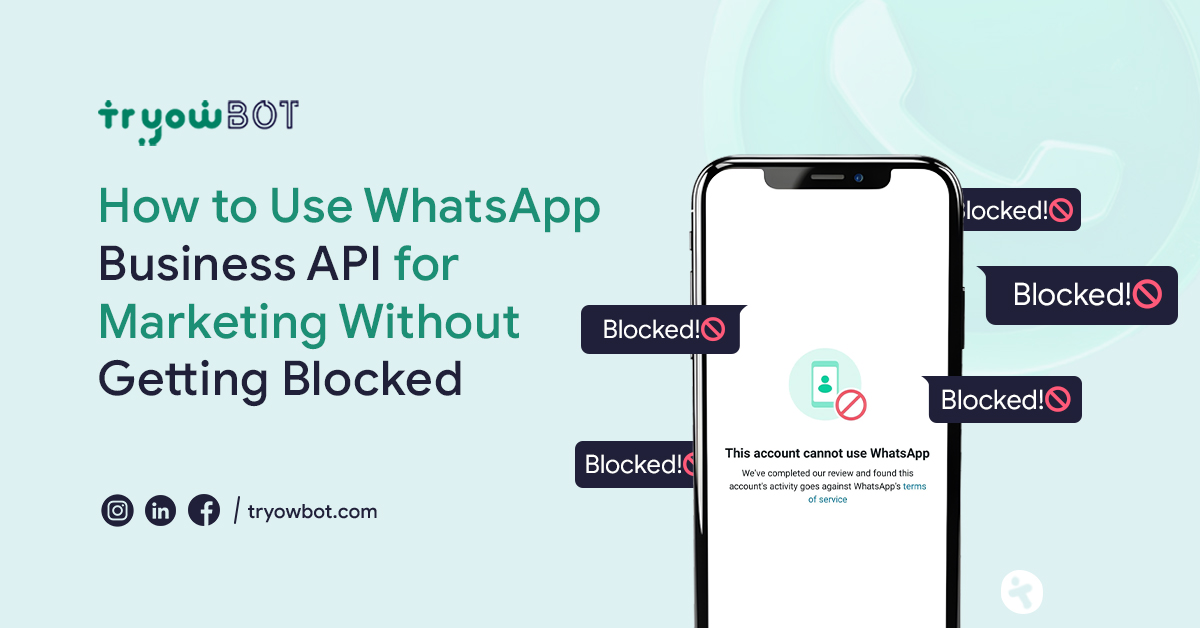WhatsApp is one of the most powerful platforms for business communication and marketing. With open rates reaching up to 98%, businesses worldwide are leveraging WhatsApp to promote products, share updates, and directly engage customers.
However, misuse of the platform can lead to your WhatsApp Business number being blocked—a major setback for your marketing campaigns.
This blog provides a complete guide on how to use WhatsApp Business API for marketing safely, maintain a high-quality account, and maximize customer engagement.
Why WhatsApp Blocks Business Numbers
WhatsApp prioritizes user privacy and spam prevention. Business numbers get blocked when companies:
- Send messages without customer consent
- Spam customers with bulk or irrelevant messages
- Use unapproved promotional templates
- Share misleading content
- Receive too many reports or blocks from users
- Add contacts without permission
Pro Tip: Following WhatsApp’s rules ensures safe marketing and helps maintain a trusted reputation with your audience.ways follow WhatsApp’s rules. Proper usage ensures your marketing campaigns are safe and effective.
9 Best Practices for Safe WhatsApp Marketing
1. Get Customer Opt-In
Obtaining explicit consent is the most crucial rule for WhatsApp marketing.
Effective opt-in methods:
- Website sign-up forms
- WhatsApp chat buttons
- Landing page pop-ups
- QR codes in-store or in ads
- Social media campaigns with “Message on WhatsApp”
- SMS or email opt-in
Example of valid opt-in:
“Enter your WhatsApp number to receive order updates and exclusive offers.”
Avoid: Purchasing or scraping phone numbers and sending messages without permission.
2. Use WhatsApp-Approved Message Templates
When initiating conversations, pre-approved templates are required.
Common use cases:
- Promotions and special offers
- Seasonal discounts
- Product launches
- Event invitations
❌ Avoid using pushy sales language or spammy content, which can lead to template rejection or account penalties.
3. Personalize Your Messages
Generic messages reduce engagement and increase complaints. Personalization makes customers feel valued.
Ways to personalize:
- Include the customer’s name
- Reference past purchases or order history
- Highlight interests and preferences
- Suggest recently viewed products or location-based offers
- Provide custom recommendations based on browsing behavior
Personalized messages increase click-through rates and improve customer satisfaction.
4. Monitor Your Quality Rating
The WhatsApp Business API assigns each number a Quality Rating:
- 🟢 High = Good
- 🟡 Medium = Risky
- 🔴 Low = Account in danger
Tips to maintain a high rating:
- Send only relevant messages
- Limit promotional content
- Provide easy opt-out options
- Segment your audience for better targeting
Maintaining a high-quality rating ensures message deliverability and trust.
5. Control Message Frequency
Even with opt-in, sending too many messages can annoy your audience.
Recommended frequency:
- 1–3 marketing messages per week
- Avoid sending the same offer repeatedly
- Space out campaigns to avoid spam perception
Correct frequency builds trust and keeps your number safe.
6. Segment Your Audience
Segmentation allows targeted messaging and reduces complaints.
Segment by:
- Interests and preferences
- Purchase history
- Geographic location
- Previous engagement with messages
- Cart activity or abandoned carts
- Loyalty or membership status
Segmented campaigns increase relevance and boost engagement metrics.
7. Allow Easy Unsubscribe
Always include a clear opt-out option in every marketing message.
Example:
“Reply STOP to unsubscribe from future messages.”
Transparency improves customer trust and protects your account quality rating.
8. Avoid Cold Outreach
WhatsApp prohibits cold outreach through the API.
❌ Do not:
- Message users who never interacted with your brand
- Use purchased contact lists
Only reach out to customers who have opted in voluntarily.
9. Use Rich Media & Interactive Features
The WhatsApp Business API supports interactive content that improves engagement:
- Buttons for quick actions
- Images, videos, and PDFs
- Product catalogs
- WhatsApp Flows and quick replies
Example:
“We have a special offer for you!”
[View Product] | [Chat with Agent]
Interactive messages make your marketing feel personal and engaging, reducing the perception of spam.
Benefits of Following WhatsApp Marketing Best Practices
By applying these strategies, your business can enjoy:
- Higher message delivery rates
- Increased engagement and click-through rates
- Stronger customer trust and loyalty
- Zero risk of your number being blocked
- Long-term sustainable marketing
- Improved brand reputation
A customer-first approach is the key to sustainable WhatsApp marketing success.
Conclusion
The WhatsApp Business API is a powerful marketing tool, but it must be used responsibly.
Key Takeaways:
- Always obtain proper opt-in
- Use approved message templates
- Personalize messages for better engagement
- Monitor and maintain a high-quality rating
- Keep message frequency reasonable
- Segment your audience for targeted campaigns
- Allow easy unsubscribe options
- Avoid cold outreach
- Use rich media and interactive features
Following these practices ensures your WhatsApp Business number stays safe while helping you build a loyal, engaged customer base.
Ready to start safe WhatsApp marketing? Contact us today to launch your campaigns with the WhatsApp Business API and connect with your customers effectively!

